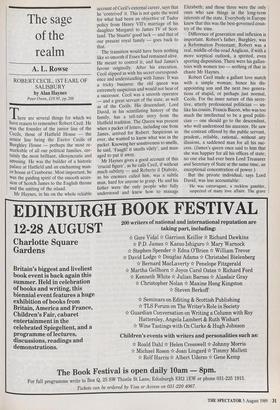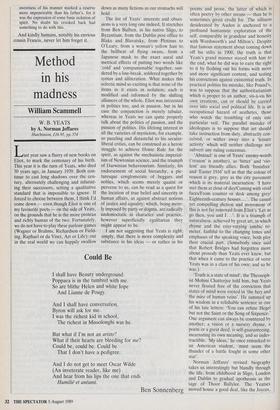The sage of the realm
A. L. Rowse
ROBERT CECIL, 1ST EARL OF SALISBURY by Alan Haynes
Peter Owen, £19.95, pp.208
There are several things for which we have reason to remember Robert Cecil. He was the founder of the junior line of the Cecils, those of Hatfield House — the senior line being the Exeter Cecils of Burghley House — perhaps the most re- markable of all our political families, cer- tainly the most brilliant, idiosyncratic and amusing. He was the builder of a historic palace at Hatfield and an enchanting man- or house at Cranborne. Most important, he was the guiding spirit of the smooth acces- sion of Scotch James to the English throne and the uniting of the island.
Mr Haynes, in his on the whole reliable account of Cecil's external career, says that he 'contrived' it. This is not quite the word for what had been an objective of Tudor policy from Henry VII's marriage of his daughter Margaret to James IV of Scot- land. The Stuarts' good luck — and that of our present royal family — goes back to that.
The transition would have been nothing like so smooth if Essex had remained alive. He meant to control it, and had James's favour originally. After his execution, Cecil slipped in with his secret correspond- ence and understanding with James. It was a tricky business: the old queen was extremely suspicious and would not hear of a successor. Cecil was a smooth operator — and a great servant of the state, as well as of the Cecils. His descendant, Lord David, in his scintillating history of the family, has a tell-tale story from the Hatfield tradition. The Queen was present when a packet of letters, including one from James, arrived for Robert. Suspicious as ever, she wanted to know what was in the packet. Knowing her sensitiveness to smells, he said, Faugh! it smells vilely', and man- aged to put it away. Mr Haynes gives a good account of this 'crucial figure', as he calls Cecil, if without much subtlety — and Roberto it Diabolo, as his enemies called him, was a subtle man, hard for anyone to grasp. He and his father were the only people who fully understood and knew how to manage Elizabeth; and those three were the only ones who saw things in the long-term interests of the state. Everybody in Europe knew that this was the best-governed coun- try of the time.
Difference of generation and inflexion is important. Robert's father, Burghley, was a Reformation Protestant; Robert was a real, middle-of-the-road Anglican, if with a more sceptical outlook, a spirited, even sporting disposition. There were his gallan- tries with women too — nothing of that in chaste Mr Haynes.
Robert Cecil made a gallant love match with a simple woman; hence his dis- appointing son and the next two genera- tions of stupid, or perhaps just normal, Cecils. For the inner nature of this secre- tive, utterly professional politician — un- like his cousin, Francis Bacon, who was too much the intellectual to be a good politi- cian — one should go to the descendant, who well understood his ancestor. He saw the contrast offered by the public servant, prudent, reliable, rational, without any illusions, a saddened man for all his suc- cess. (James's queen once said to him that she was happier for all his offices of state; no one else had ever been Lord Treasurer and Secretary of State at the same time, an exceptional concentration of power.)
But the private individual, says Lord David, was less accountable:
He was extravagant, a reckless gambler, suspected of many love affairs. The grave sweetness of his manner marked a reserve more impenetrable than his father's, for it was the expression of some basic isolation of spirit. No doubt his crooked back had something to do with this.
And kindly humans, notably his envious cousin Francis, never let him forget it.



















































 Previous page
Previous page